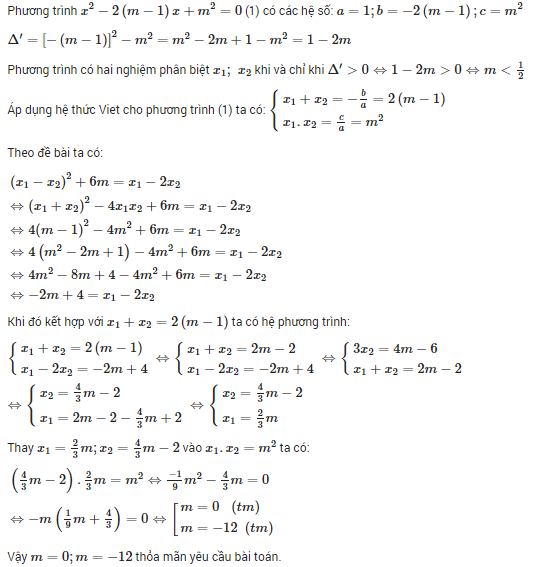Hãy nhập câu hỏi của bạn vào đây, nếu là tài khoản VIP, bạn sẽ được ưu tiên trả lời.

\(\Delta=\left(-m\right)^2-2.1.\left(m-1\right)\\ =m^2-2m+1\\ =\left(m-1\right)^2\)
Phương trình có hai nghiệm phân biệt :
\(\Leftrightarrow\Delta>0\\ \Rightarrow\left(m-1\right)^2>0\\ \Rightarrow m\ne1\)
Theo vi ét :
\(\Leftrightarrow\left\{{}\begin{matrix}x_1+x_2=m\\x_1x_2=m-1\end{matrix}\right.\)
\(x^2_1+x^2_2=x_1+x_2\\ \Leftrightarrow x^2_1+x^2_2=m\\ \Leftrightarrow\left(x^2_1+2x_1x_2+x_2^2\right)-2x_1x_2=m\\ \Leftrightarrow\left(x_1+x_2\right)^2-2x_1x_2-m=0\\ \Leftrightarrow m^2-2\left(m-1\right)-m=0\\ \Leftrightarrow m^2-2m+2-m=0\\ \Leftrightarrow m^2-3m+2=0\\ \Leftrightarrow\left[{}\begin{matrix}m=1\left(loại\right)\\m=2\left(t/m\right)\end{matrix}\right.\)
Vậy \(m=2\)

a: Khi m=1 thì (1): x^2-2(1-2)x+1^2-5-4=0
=>x^2+2x-8=0
=>(x+4)(x-2)=0
=>x=2 hoặc x=-4
b: Δ=(2m-4)^2-4(m^2-5m-4)
=4m^2-16m+16-4m^2+20m+16
=4m+32
Để pt có hai nghiệm phân biệt thì 4m+32>0
=>m>-8
x1^2+x2^2=-3x1x2-4
=>(x1+x2)^2+x1x2+4=0
=>(2m-4)^2+m^2-5m-4+4=0
=>4m^2-16m+16+m^2-5m=0
=>5m^2-21m+16=0
=>(m-1)(5m-16)=0
=>m=16/5 hoặc m=1

Chị quản lí ơi để phương trình có 2 nghiệm phân biệt thì \(\Delta>0\)!
Quá dễ . số cần tìm là 10 . Đúng đấy , bài này mk làm rồi , chắc chắn 100% luôn !!!

\(\Delta=1-4\left(m+1\right)>0\Rightarrow m< -\dfrac{3}{4}\)
Khi đó theo hệ thức Viet: \(\left\{{}\begin{matrix}x_1+x_2=1\\x_1x_2=m+1\end{matrix}\right.\)
\(x_1^2+x_1x_2+3x_2=7\)
\(\Leftrightarrow x_1\left(x_1+x_2\right)+3x_2=7\)
\(\Leftrightarrow x_1+3x_2=7\)
Kết hợp Viet ta được: \(\left\{{}\begin{matrix}x_1+x_2=1\\x_1+3x_2=7\end{matrix}\right.\) \(\Rightarrow\left\{{}\begin{matrix}x_1=-2\\x_2=3\end{matrix}\right.\)
Thế vào \(x_1x_2=m+1\)
\(\Rightarrow m+1=-6\Rightarrow m=-7\)

\(x^2-2\left(m-1\right)x+m^2-4=0\)
\(\Delta=b^2-4ac=\left[-2\left(m-1\right)\right]^2-4\left(m^2-4\right)\)
\(=4\left(m^2-2m+1\right)-4\left(m^2-4\right)\)
\(=4m^2-8m+4-4m^2+16\)
\(=-8m+20\)
Để pt đã cho có 2 nghiệm pb \(x_1,x_2\) thì \(\Delta>0\Leftrightarrow-8m+20>0\Leftrightarrow-8m>-20\Leftrightarrow m< \dfrac{5}{2}\)
Theo Vi-ét, ta có :
\(\left\{{}\begin{matrix}x_1+x_2=-\dfrac{b}{a}=2\left(m-1\right)\\x_1x_2=\dfrac{c}{a}=m^2-4\end{matrix}\right.\)
Ta có : \(x_1\left(x_1-3\right)+x_2\left(x_2-3\right)=6\)
\(\Leftrightarrow x_1^2-3x_1+x^2_2-3x_2=6\)
\(\Leftrightarrow\left(x_1^2+x_2^2\right)-3\left(x_1+x_1\right)-6=0\)
\(\Leftrightarrow\left(x_1+x_2\right)^2-2x_1x_2-3\left(x_1+x_2\right)-6=0\)
\(\Leftrightarrow\left(2m-2\right)^2-2\left(m^2-4\right)-3\left(2m-2\right)-6=0\)
\(\Leftrightarrow4m^2-8m+4-2m^2+8-6m+6-6=0\)
\(\Leftrightarrow2m^2-14m+12=0\)
\(\Leftrightarrow\left\{{}\begin{matrix}m=6\left(ktm\right)\\m=1\left(tm\right)\end{matrix}\right.\)
Vậy m = 1 thì thỏa mãn đề bài.

Để phương trình 1 có 2 nghiệm phân biệt
=> \(\Delta,>0\) <=> \(\left[-\left(m-1\right)\right]^2-\left(-2m+5\right)>0\)
<=>\(\left[{}\begin{matrix}m>2\\m< -2\end{matrix}\right.\)
=> Theo hệ thức Vi ét ta có
\(\left\{{}\begin{matrix}x_1+x_2=2\left(m-1\right)\circledast\\x_1.x_2=-2m+5\circledast\circledast\end{matrix}\right.\)
Theo bài ra ta có
\(x_1-x_2=-2\circledcirc\)
Từ \(\circledast vaf\circledcirc\) ta có hệ pt
\(\left\{{}\begin{matrix}x1+x2=2m-2\\x1-x2=-2\end{matrix}\right.\) <=>\(\left\{{}\begin{matrix}x1=m-2\\x2=m\end{matrix}\right.\)
Thay x1 và x2 vào \(\circledast\circledast\)ta dc
\(\left(m-2\right)m=-2m+5\)
<=> m=\(\left[{}\begin{matrix}-\sqrt{5}\\\sqrt{5}\end{matrix}\right.\left(tm\right)\)
Vậy ...

Δ=(-2)^2-4(m-1)
=-4m+4+4
=-4m+8
Để phương trình có hai nghiệm phân biệt thì -4m+8>0
=>-4m>-8
=>m<2
x1^2+x2^2-3x1x2=2m^2+|m-3|
=>2m^2+|m-3|=(x1+x2)^2-5x1x2=2^2-5(m-1)=4-5m+5=-5m+9
TH1: m>=3
=>2m^2+m-3+5m-9=0
=>2m^2+6m-12=0
=>m^2+3m-6=0
=>\(m\in\varnothing\)
TH2: m<3
=>2m^2+3-m+5m-9=0
=>2m^2+4m-6=0
=>m^2+2m-3=0
=>(m+3)(m-1)=0
=>m=1 hoặc m=-3

Lời giải:
Để pt có 2 nghiệm pb thì:
$\Delta'=1-(2-m)=m-1>0\Leftrightarrow m>1$
Áp dụng định lý Viet: \(\left\{\begin{matrix} x_1+x_2=2\\ x_1x_2=2-m\end{matrix}\right.\)
Khi đó:
$2x_1^3+(m+2)x_2^2=5$
$\Leftrightarrow 2x_1^3+(2x_1+2x_2-x_1x_2)x_2^2=5$
$\Leftrightarrow 2(x_1^3+x_2^3)+x_1(2-x_2)x_2^2=5$
\(\Leftrightarrow 2[(x_1+x_2)^3-3x_1x_2(x_1+x_2)]+x_1^2x_2^2=5\)
\(\Leftrightarrow 2[8-6(2-m)]+(2-m)^2=5\)
\(\Leftrightarrow m^2+8m-9=0\Leftrightarrow (m-1)(m+9)=0\)
Vì $m>1$ nên không có giá trị nào của $m$ thỏa mãn.

b: Δ=(-2m)^2-4(m^2-2m+2)
=4m^2-4m^2+8m-8=8m-8
Để pt có 2 nghiệm phân biệt thì 8m-8>0
=>m>1
x1^2+x2^2=x1+x2+8
=>(x1+x2)^2-2x1x2-(x1+x2)=8
=>(2m)^2-2(m^2-2m+2)-2m=8
=>4m^2-2m^2+4m-4-2m=8
=>2m^2+2m-12=0
=>m^2+m-6=0
=>(m+3)(m-2)=0
mà m>1
nên m=2


\(\text{Δ}=\left(-1\right)^2-4\cdot1\cdot\left(m-3\right)\)
=1-4(m-3)
=1-4m+12
=-4m+13
Để phương trình có hai nghiệm phân biệt thì Δ>0
=>-4m+13>0
=>-4m>-13
=>\(m< \dfrac{13}{4}\)